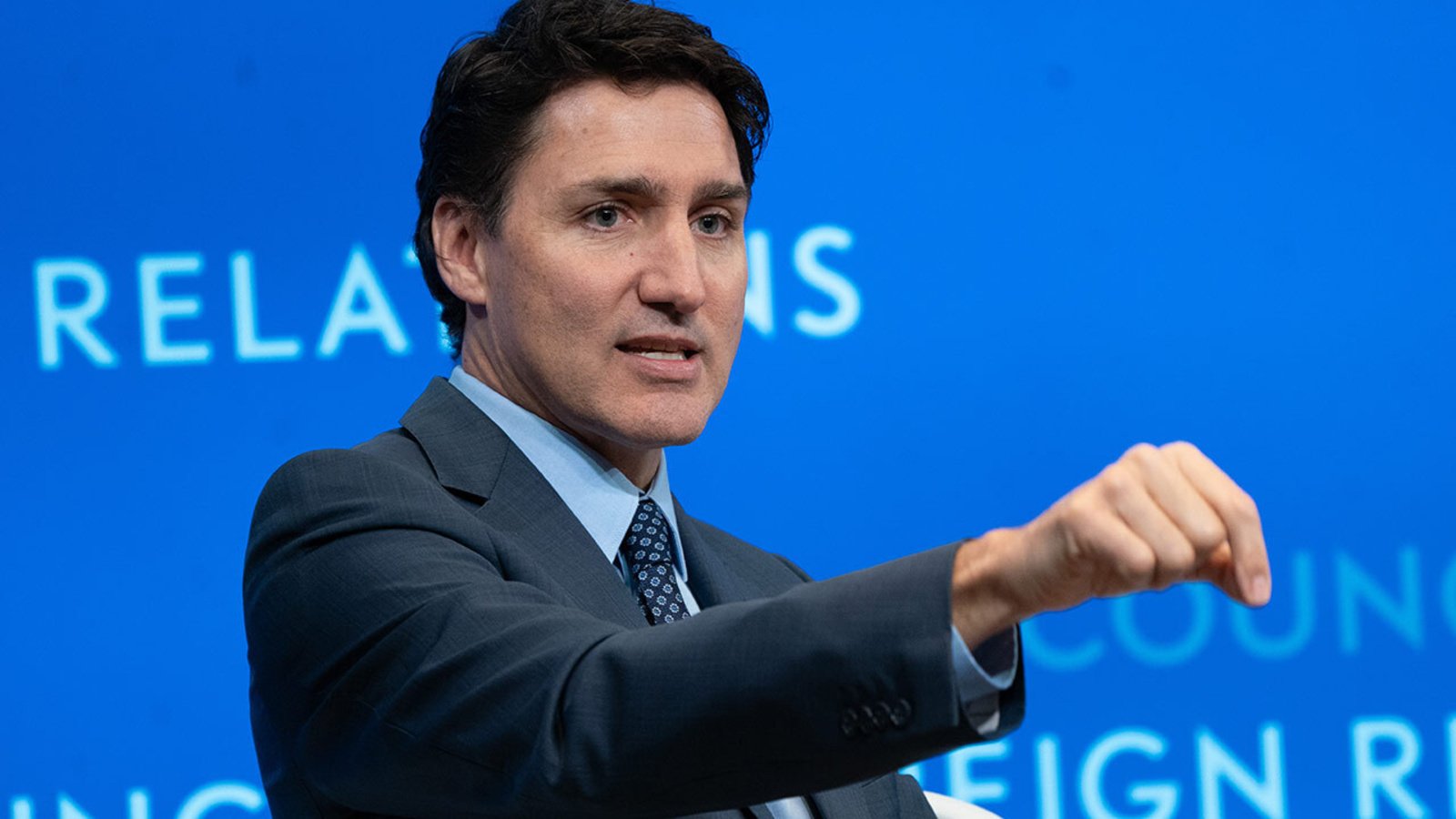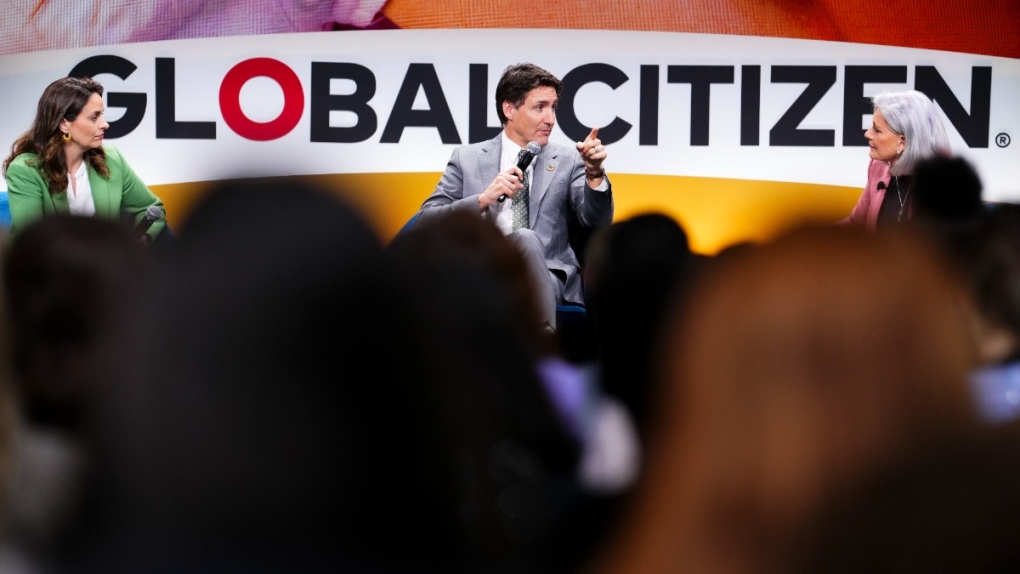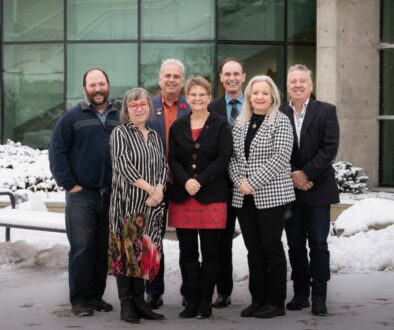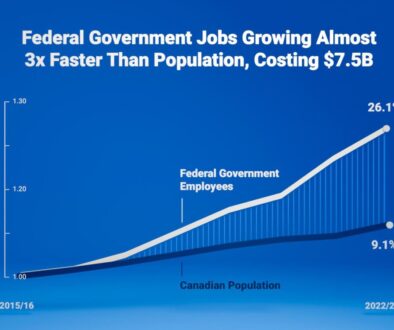Trudeau speech at Council on foreign relations
The Council on Foreign Relations (CFR) is an American think tank specializing in U.S. foreign policy and international relations. Founded in 1921, it is an independent and nonpartisan nonprofit organization. CFR is based in New York City, with an additional office in Washington, D.C.. Its memberships has included senior politicians, numerous secretaries of state, CIA directors, bankers, lawyers, professors, corporate directors and CEOs, and senior media figures.{ source Wikipedia}
https://rumble.com/v2yg7po-council-of-foreign-relations.html
I’m Richard Haass. Good morning and bonjour. I want to welcome all of you to the Council on Foreign Relations and to today’s on-the-record meeting with Prime Minister Justin Trudeau of Canada, also known as twenty-three.
Bonjour. Thank you, Richard, for having me here at the Council on Foreign Relations. Merci à tous d’être ici.
It’s great to be back in New York. This is a place where the world comes together, comes to connect, and the Council is a great institution for that very reason.
Last month, Canada welcomed President Biden to our Parliament. The president is a great guy. He’s not only a strong partner of Canada; he’s an enduring friend. Before he started his address, I remembered how President Reagan over three decades ago called the U.S.-Canada border a meeting place rather than a dividing line. And I pointed out that today our border is no longer just a place where we meet each other; it’s a place where we will meet the moment. And this is a moment of uncertainty like we haven’t seen in our lifetimes.
We are three years into a global pandemic. The rising cost of living is putting real stress on families. Despite job growth and wage growth, there’s a lot of economic anxiety. Climate change is having a real and terrifying impact on people’s lives. War has returned to Europe and authoritarianism is on the rise. Antagonistic states around the world are using our economic interdependence for their own geopolitical advantage. And all around us, we see more and more polarization. Every day it seems like new threats arise that threaten to weaken democracy.
So let’s talk about meeting this moment, what Canada can be for the U.S. and what we can be together for the world. But before I do that, let me talk about where we’ve been and how we got to this particular moment.
Let’s all think back to that time of Reagan and the optimism we all had about the inevitable triumph of our way of life. With the fall of the Berlin Wall, we were sure that market-based democracy was triumphant and it was going to take hold all around the world. Political elites devoted themselves to trade liberalization and deregulation, to lowering taxes for corporations because the economy would grow faster and everyone would get richer.
Well, the former certainly happened; the latter, not so much. Jobs that went offshore weren’t being replaced and the wages that supported entire communities stagnated. When 2008 happened, banks got bailouts and families got foreclosures. People at home were getting left behind. The middle class was getting hollowed out. And at the same time, we had that promise of globalization—that the rising tide would encircle the globe and lift all boats. Well, let’s be honest with ourselves that we weren’t being straight with ourselves about that either. We talked up the superiority of our system but turned a blind eye to the authoritarianism, worker exploitation, and environmental degradation on the other side of the world, and that our prosperity relied on. And that prosperity? Well, those in charge weren’t making sure that it was being shared across the board at home, either. We were not living up to the promise of progress.
See, if we don’t step up, other forces will step in. As likeminded democracies, as major economies, we need to work together to meet this moment. We need to stand up for what we believe in and be honest with ourselves about where we’re not doing enough. We need to engage with the world and put in place policies that reinforce our values everywhere. If we believe in freedom, equality, a healthy environment, rule of law, then we have to believe it for everyone.
In the aftermath of 2008, there was a lot of distrust and anger—understandable anger—from citizens. GDP grew, but wages stalled. And the promise of progress, that promise that each generation would do better through the hard work of the one before, no longer seemed to hold true.
So, by the mid-teens, people were faced with a political choice. One was to burn it all down—to attack our institutions, to be isolationist, protectionist, nativist. The other was to roll up our sleeves and get to work fixing it. In Canada, that’s the path we chose in 2015. While other places were tearing up trade deals, we actually signed more. Canada is the only G-7 country with a free trade deal with every other G-7 country. We signed onto the CPTPP. Canada has privileged access to almost two-thirds of the global economy. And the reason we were able to do it even at a time when people were anxious and turning inwards is because we made sure those deals were fair.
See, trade creates growth. We all know that. But you need deliberate and specific policies to ensure that that growth is fair and the benefits are shared by everyone. When we renegotiated NAFTA, we improved it by improving stronger standards for workers and more protections for our environment. And in so doing, we secured one of the biggest free-trade zones in the world, and with it millions of jobs right across North America. In order to get our trade deal done with Europe, we included gender and labor provisions and environmental protections. Going forward, we need to do even more of that strategic thinking.

Photo source: www.cfr.org
So how do we do that? We can’t just push back or punish, single out bad actors. We can’t just say, for example, that we want our companies to restrict the amount of critical minerals they buy from China specifically. Instead, we should simply commit to sourcing our critical minerals from places that ban forced labor, that have safety standards, the pay their workers a living wage, that have high environmental protections, that work in partnership with indigenous peoples. That creates incentives that makes the right thing to do also the smart thing to do for economies around the world.
See, this is where the market is going. Countries in Europe that relied on Russian fossil fuels have accelerated their investments in clean energy. Here in the U.S., the Inflation Reduction Act is mobilizing capital towards a clean economy on a historic scale. Canada is making our own investments to meet this demand and be the reliable supplier of clean energy a net-zero world will require. We already have one of the cleanest electricity grids in the world, with around 83 percent of our electricity generated from non-emitting sources. And our plan is to reach 100 percent by 2035, even as we massively increase generating capacity. This is a huge competitive advantage for Canada.
And we see these choices at play in other ways too. On the industrial scale, take a look at what’s happening with steel, for example. Global demand is fairly flat, but the demand for green steel, well that’s going through the roof. You know who makes some of the cleanest steel in the world? Workers in Canada. But that didn’t happen by accident. To use a Canadian expression, our government saw where the puck was going. (Laughter.) And we started making investments in our workers’ future. We saw what was coming with climate change, and the trillions of dollars of global investment that were lining up to build the clean economy. So we invested in a decarbonization project at the ArcelorMittal Dofasco plant in Ontario that’ll see Canada make some of the cleanest steel in the world.
And that’s good for the company, and it’s good for the brand, and it’s for the environment. But mostly it means that third-generation steel workers can know that good, middle-class jobs that were there for them, their parents, their grandparents, will also be there for their kids, their grandkids, and their great-grandkids. We have secured seventh, eighth, ninth generation steel workers for that mill, and opportunities for all the new Canadians coming to our country every year too. That’s opportunity. That’s possibility. That’s growth. That is reassuring for citizens.
When everyone can see the possibilities for themselves, everyone has a stake in our success, which is so important. Because democracies like ours, for them to work everyone has to feel like they have a stake in it, like they’re going to benefit from it. And I mean everyone, from the newly arrived racialized immigrant to the fifth-generation blue-collar working dad who just doesn’t see where he fits in anymore. And as leaders, we have to create the conditions that create opportunity for everyone.

Photo source: ctvnews.ca
In Canada, we’ve invested in strengthening the middle class. We’ve invested in education, in skills, in health care, in dental care, and childcare. And we’re already seeing the results on a macroeconomic scale. By rolling out $10 a day childcare, we’ve seen women’s participation in the workforce already reach all-time highs. Global investors—global investors are looking around the world. They’re looking for stability. They’re looking for growth in the workforce. They’re looking for workers that are well supported. They’re looking for a constructive political environment. That’s why they’re coming to Canada.
And I’ve sketched out a few ideas here this morning but let me connect the dots. The world is a tough place. Democracy is under threat. The old way of doing things isn’t going to work anymore. Things are changing fast. People are polarized. We are at an inflection point. People are anxious about the changes that lie ahead. We’ve got authoritarian states claiming that the reason democracy isn’t winning is because there’s a flaw in the theory of democracy. But we know that’s not true. But of all the things that erode democracy, the failings of the promise of progress has got to be the most pernicious. That people no longer believe that the next generation will do even better than this one, here at home or anywhere around the world.
Canada and the U.S., as robust democracies, as trading partners, as G-7 partners, as NATO allies, have a role to play in making sure that we are living up to that progress, to that promise—to that promise of progress we make to people all around the world when we talk about how our system works.
Canada has worked to demonstrate that when we strengthen the middle class we strengthen social cohesion, we reinforce faith in our democratic institutions at home, and engage with the world in consequential and positively impactful ways. And major global investors are looking around the world to where they can be part of that.
Canada will always be a reliable partner because the key is simple. Make sure you’re putting people first. As your president says, grow the economy from the bottom up and the middle out. Put people’s dignity, their rights, their environment, and their future at the center of what we do as policymakers, as businesspeople, as commentators, as champions of democracy and rules-based trade. That’s how we deliver on the promise of progress for everyone.
Justin Trudeau, New York, April 28, 2023.
DB



